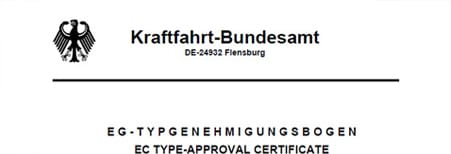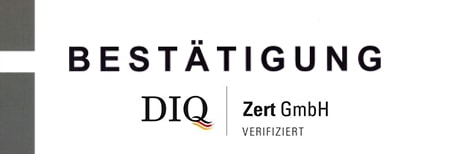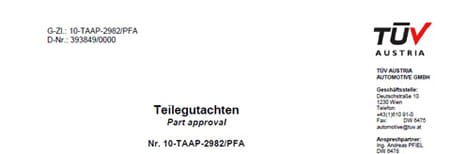Do you need TÜV registration ? To comply with Section 19 Para. 3 StVZO, your vehicle must undergo evaluation by an officially recognized expert, technical testing center, or testing engineer.
A valid Quality Management (QM) system and E-approval for optimization modules, are prerequisites for obtaining a TÜV parts report or part type approval / ABE. H.&N. Electronics GmbH holds a QM system recognized by the German Federal Motor Transport Authority (KBA-ZM-A 00011-15), and all Diesel Power® and MultiMotion® optimization modules offered, have E1 approval
(E110R06/029979* 00), recognized in all United Nations countries.
With an E-approval, optimization modules can be installed in motor vehicles, as an "electronic subassembly".
The TÜV parts report or part type approval / ABE, provides information on exhaust behavior, performance, noise emissions, and top speed.
H.&N. Electronics GmbH possesses over 600 TÜV parts certificates, for more than 3000 vehicle types. However, providing TÜV parts reports for all vehicles, compatible with our optimization modules, may not be feasible.
A valid Quality Management (QM) system and E-approval for optimization modules, are prerequisites for obtaining a TÜV parts report or part type approval / ABE. H.&N. Electronics GmbH holds a QM system recognized by the German Federal Motor Transport Authority (KBA-ZM-A 00011-15), and all Diesel Power® and MultiMotion® optimization modules offered, have E1 approval
(E110R06/029979* 00), recognized in all United Nations countries.
With an E-approval, optimization modules can be installed in motor vehicles, as an "electronic subassembly".
The TÜV parts report or part type approval / ABE, provides information on exhaust behavior, performance, noise emissions, and top speed.
H.&N. Electronics GmbH possesses over 600 TÜV parts certificates, for more than 3000 vehicle types. However, providing TÜV parts reports for all vehicles, compatible with our optimization modules, may not be feasible.





